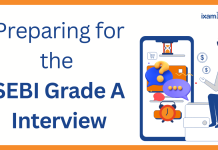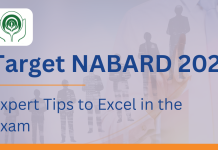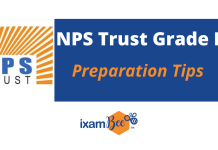In the realm of Indian competitive exams, where the Union Public Service Commission (UPSC), Staff Selection Commission (SSC), and Institute of Banking Personnel Selection (IBPS) reign supreme, aspiring candidates embark on a journey fraught with challenges and aspirations. The allure of securing a stable government job persists even as the economy undergoes widespread privatization. Yet, achieving success in these exams remains elusive for many despite unwavering dedication.
Contrary to common misconceptions that success hinges on marathon study sessions, innate intellect, or a complete sacrifice of personal pursuits, the truth lies in a well-defined approach and strategic planning. The belief that only those dedicating 12+ hours daily or sacrificing all other activities can crack these exams is debunked by the fact that success is more about quality than quantity.
In this era of heightened competition, the key to standing out from the crowd lies in hard work and adopting the correct approach. This blog aims to dissect the significant government recruitment exams conducted annually, shedding light on their intricacies, such as syllabi, essential topics, and evaluation criteria. By debunking myths and providing valuable insights into the preparation strategies, we aim to guide aspiring candidates toward a more effective and focused approach to cracking these competitive exams. Join us on this exploration as we unravel the secrets to success and empower individuals with the knowledge to navigate the challenging landscape of government exams.

Why Government Jobs
In India, the Government sector stands as a colossal source of employment, annually extending opportunities to lakhs of candidates who aspire to become government employees and relish the associated benefits. Job security reigns supreme in the Government sector, offering employees unparalleled stability. This unwavering assurance of employment is a significant draw, especially when job uncertainties prevail. Financial security further sweetens the deal, as government jobs are renowned for their competitive pay scales, perks, benefits, and allowances. The robust compensation packages attract candidates and contribute significantly to their job satisfaction.
The Government and Banking sectors are revered for their status quo, enjoying a reputation as some of the most respectable industries. The prestige associated with being a government or banking employee adds an extra layer of gratification to the job. This respect extends beyond professional circles and becomes a source of pride for individuals and their families. Work-life balance is another key advantage that government employees cherish. With well-defined working hours and structured schedules, a harmonious equilibrium exists between professional responsibilities and personal life. This balance ensures that employees can fulfill their work commitments without compromising on their personal well-being.
Beyond the tangible benefits, qualifying for competitive exams and securing a position in a government, insurance, or banking organization instills individuals’ profound sense of accomplishment and contentment. The journey from exam preparation to joining a respected organization is a testament to one’s dedication and capabilities, fostering a positive and fulfilling sense of achievement. In essence, the government sector offers employment and provides a holistic package of security, financial stability, prestige, work-life balance, and personal fulfillment. These facets collectively make a government job a highly sought-after and rewarding career path in India. Let’s look closer at the list of Government Jobs available for prospective applicants in India.
| Categories | Exams |
| SSC (Staff Selection Commission) | SSC CGL (Combined Graduate Level Exam), SSC CHSL (Combined Higher Secondary Level), SSC JE (Junior Engineer), SSC CPO (Central Police Organisation), SSC GD (General Duty Constable)SSC MTS (Multi Tasking Staff), SSC Stenographer |
| RRB (Railway Recruitment Board) | RRB ALP (Assistant Loco Pilot), RRB NTPC (Non-Technical Popular Categories), RRB JE (Junior Engineer), RRB Grade D |
| UPSC (Union Public Service Commission) | UPSC CAPF (Central Armed Police Forces Assistant Commandant) |
| SBI (State Bank of India) | SBI PO (Probationary Officer)SBI SO (Specialist Officer)SBI Clerk (Junior Associate and Customer Support) |
| IBPS (Institute of Banking Personnel Selection) | IBPS PO (Probationary Officer), IBPS SO (Specialist Officer), IBPS Clerk, IBPS RRB (Regional Rural Bank Exam) |
| RBI (Reserve Bank of India) | RBI Grade B (Officer Scale), RBI Assistant |
| NIACL (New India Assurance Company Limited) | NIACL Assistant, NIACL AO (Administrative Officer) |
| NICL (National Insurance Company Limited) | NICL Exam |
| LIC (Life Insurance Corporation of India) | LIC AAO (Assistant Administrative Officer), LIC ADO (Apprentice Development Officer), LIC HFL (Housing Finance Limited) |
| FCI (Food Corporation of India) | FCI Manager Exam |
| Defense | National Defence Academy Exam (NDA), Combined Defence Service Exam (CDS), Air Force Common Admission Test (AFCAT) |
| NABARD (National Bank for Agriculture and Rural Development) | NABARD Exam |
| SIDBI (Small Industries Development Bank of India) | SIDBI Exam |
| IB (Intelligence Bureau) | Assistant Central Intelligence Officer in the Intelligence Bureau (ACIO IB) |
| CDSE (Combined Defence Services Examination) | Combined Defence Services Examination (CDSE) |
| IES (Indian Economic Exam Service) | Indian Economic Exam Service |
Preparation Strategy for Government Exams
Embarking on competitive exam preparation often raises myriad questions. From strategizing study plans to cracking exams in the first attempt, candidates seek practical guidance. We present 11 critical strategies for successful government exam preparation to address these concerns. These strategies encompass essential aspects, from setting goals and managing time effectively to attending regular classes, revising daily, and solving mock tests. Focusing on conceptual clarity, selecting resources wisely, and maintaining discipline contribute to a comprehensive and strategic preparation approach.
- Set S.M.A.R.T Goals: To ensure success in government exams, set goals that are specific, measurable, achievable, relevant, and time-bound(S.M.A.R.T) . Define precise study objectives, quantify your progress, ensure feasibility, align goals with exam requirements, and establish a realistic timeline for completion. These well-defined goals provide a roadmap, clearly directing your preparation journey and helping you manage time effectively.
- Self Management vs Time Management: Strike a balance between self and time management by setting manageable study targets aligned with your capabilities. Maintaining a well-balanced schedule accommodating study sessions, breaks, and other responsibilities. This dual approach fosters personal accountability and efficient time utilization, essential for navigating the demanding landscape of competitive exams.
- Attend Online/Offline Classes Regularly: Regular attendance in online or offline classes is fundamental to exam preparation. Consistent participation ensures a comprehensive understanding of topics, allows real-time instructor interaction, and provides valuable insights. Whether through virtual platforms or physical classrooms, active engagement enhances your grasp of complex subjects, ensuring you stay ahead in your preparation. ixambee’s online courses for Government Exam Preparation is one of the prime examples of online classes for candidates seeking recruitment for government jobs.
- Revise daily: Daily revision is a cornerstone of effective learning. Devote time daily to review previously studied material, reinforce concepts, and identify areas needing further attention. This consistent approach solidifies your understanding and minimizes the risk of forgetting crucial information. Daily revision is a proactive measure to retain knowledge, contributing significantly to your overall preparedness.
- Solve Time-Bound Exercises, Mock Tests & Model Papers: Immerse yourself in time-bound exercises, mock tests, and model papers to simulate exam conditions. This practice familiarizes you with the exam pattern and enhances your time management efficiency during the test. Diversify your practice with various questions, exposing yourself to different complexities and scenarios. Regularly engaging in ixambee’s free mock tests for government exams. It provides a practical and strategic approach, equipping you with the skills needed to navigate the diverse challenges posed by competitive exams.
- Raise Doubts or Questions: Promote open communication by actively seeking clarification on any doubts or questions during your study sessions. Timely resolution of queries ensures a thorough understanding of concepts and prevents the accumulation of uncertainties. Don’t hesitate to engage with teachers, fellow aspirants, or online forums to gain insights and perspectives that contribute to conceptual clarity. A proactive approach to seeking answers fosters a dynamic learning environment, ensuring your preparation is built on clarity and confidence.
- Prepare well for Current Affairs: Stay abreast of the latest happenings with ixamBee’s beepedia, a comprehensive resource providing updates on crucial aspects like the Union Budget and Economic Survey. Regularly peruse newspapers and other general knowledge awareness platforms to ensure a well-rounded understanding of current affairs, a pivotal component in competitive exams. This proactive approach aids in answering dynamic questions that may be part of the examination, enhancing your overall preparedness.
- Thorough Conceptual Understanding: Develop a robust foundation by ensuring a thorough conceptual understanding of all subjects. Strive for clarity in complex topics, seek additional resources for challenging concepts, and foster a deep comprehension beyond surface-level knowledge. This approach is instrumental in addressing diverse questions with confidence during the exam.
- Focus: Achieve exam success by maintaining undivided attention during study sessions. Minimize distractions by creating a dedicated study environment, silencing unnecessary notifications, and prioritizing focused learning. This concentrated effort significantly improves the quality of study hours and enhances your ability to absorb and retain information effectively.
- Solve Previous Year Question Papers: Gain a strategic advantage by solving ixambee’s previous year papers. This practice familiarizes you with the exam pattern and exposes you to the standard of questions asked. Analyzing past papers helps identify recurring topics, question formats and aids in fine-tuning your preparation according to the exam’s expectations.
- Be Regular, Well-planned, and Disciplined: Craft a structured study plan, ensuring regularity and discipline in your preparation. Familiarize yourself with the exam details, including the syllabus, marking scheme, and time allocation for each section. A well-planned approach, coupled with discipline, ensures consistent progress, minimizes last-minute stress, and optimizes your chances of success in competitive exams.
Government Exams: Common Syllabus
The syllabus for most government exams like SBI, RBI, IBPS, and NABARD encompasses various sections, each crucial for a candidate’s comprehensive preparation. In the quantitative aptitude section, questions delve into logical reasoning and non-verbal reasoning. Aspirants can find detailed syllabi and topic-wise questions on logical reasoning pages for thorough coverage. The quantitative aptitude and data interpretation section, often extensive and complex, includes topics like word problems, graphs, and simplification. Candidates are encouraged to visit the quantitative aptitude page for a detailed breakdown and begin preparing accordingly, leveraging fundamental knowledge in arithmetic and mathematics.
The English language/verbal ability section, a consistent presence in government exams, demands meticulous attention due to the intricacies of language rules. Aspirants should focus on grammar elements such as tenses, prepositions, conjunctions, active/passive voice, and direct/indirect speech. Notably, this section sometimes includes descriptive tests, adding an extra layer of challenge. Another significant section is computer knowledge, a manageable yet scoring part of the syllabus. Candidates can enhance their basic computer knowledge through provided links.
General awareness and current affairs, an omnipresent section in government exams, encompasses a vast syllabus. Questions may span general knowledge, daily news, history, geography, politics, banking awareness, etc. Staying updated on global events from the last 4 to 5 months before the exam is crucial. Aspirants can refer to linked resources to bolster their preparation in this diverse and information-intensive section.
| Section | Topics |
| General Awareness | Monetary Policies, Banking & Financial Awareness, Economic Terms, Current Affairs, Static GK, Financial & Economics News, Government Schemes, Agreement & Deals, Banking terms, rates, processes, National Institution, Beepedia |
| Quantitative Aptitude | Time and Work, Mensuration, Average, Speed, Distance and Time, Mixture and Allegations, Permutation and Combination, Probability, Data Interpretation, Ratio & Proportion, Simplification & Approximation, Percentage, Set Theory, Data Interpretation, Quadratic Equation, Number Series, Profit & loss, Boats & Stream, Simple and Compound Interest, Data Sufficiency |
| Reasoning Ability | Puzzles, Seating Arrangement – Circular, Square and Linear, Data Sufficiency, Directions and Distance, Coding Decoding, Blood Relations, Inequality, Syllogism, Machine Input Output, Verbal Reasoning, Ordering and Ranking, Alphanumeric Series |
| English Language | Grammar, Vocabulary, Reading Comprehension, Passage Making, Error Spotting, Jumble Words, Sentence Framing, Fill in the Blanks, Cloze Test, Sentence Rearrangement, Idioms & Phrases |
| Computer Knowledge | Computer Languages, Basic Hardware and Software, History of Computer, Devices, Viruses and Hacking, MS Office, Networking |
Government Exams Subject-wise Preparation Strategies
Let’s take a look at some of the subject-based preparation tips for Government Exams:
- General Awareness: In General Awareness, diversify your information sources to gain a comprehensive understanding of current affairs. Regularly read newspapers, magazines, and reliable online platforms to stay updated on national and international events. Reinforce your knowledge through regular revisions and quizzes, testing your understanding and identifying areas that require further attention. This dynamic approach ensures a well-rounded awareness of topics crucial for various government exams.
- Quantitative Aptitude: Mastering the fundamentals is key in Quantitative Aptitude. Strengthen your foundation in arithmetic and mathematics, emphasizing core concepts such as percentages, ratios, and basic arithmetic operations. To excel in this section, practice various question types, including data interpretation, algebra, and geometry. Regularly attempt mock tests and previous year papers to expose yourself to different question patterns, enhancing adaptability during the exam.
- Reasoning Ability: Develop a systematic approach to cover topics in Reasoning Ability. Begin with understanding basic concepts and gradually progress to complex ones, focusing on topics like syllogism, blood relations, and coding-decoding. Effective time management is crucial in this section, so practice solving problems within allocated time limits. Prioritize questions based on difficulty levels to optimize your overall performance in the reasoning ability section.
- English Language: In English Language preparation, prioritize mastering grammar elements such as tenses, prepositions, and conjunctions. This forms the foundation for effective communication. Focus on building a focused vocabulary by engaging with newspapers, magazines, and vocabulary-building exercises. A strong vocabulary not only aids in comprehension but also contributes to excelling in descriptive sections. Regular practice in both grammar and vocabulary ensures a well-rounded preparation for the English language section.
- Computer Knowledge: For Computer Knowledge, build a foundational understanding of computer basics, including terms, hardware, and software components. Familiarity with fundamental concepts lays the groundwork for more advanced topics. Regularly practice with mock tests specifically designed for the computer knowledge section to simulate exam conditions. This approach enhances your confidence and efficiency in answering computer-related questions during the exam.
Summing Up
In government exams, success is crafted through strategic planning, not endless hours. This blog dismantles myths, offering insights into competitive exams’ intricacies. Government jobs, epitomes of stability, financial security, and prestige, remain a coveted career choice. From comprehensive exam strategies to subject-wise preparation tips, this guide aims to empower aspirants. Unveil the secrets to crack exams, balance study and life, and embark on a fulfilling journey toward a rewarding government career.
To help you prepare 50% faster for competitive exams, ixamBee provides a free Mock Test Series and all the Current Affairs in English and Current Affairs in Hindi in the BeePedia capsules for GA Preparation. You can also get the latest updates for Bank PO, Bank Clerk, SSC, RBI Grade B, NABARD, and Other Government Jobs.
Also Read
List of High Courts in India As Per 2024
How to Prepare for the CSIR Section Officer/Assistant Section Officer Exam?
Upcoming Banking And Insurance Jobs in 2024









![IBPS Clerk Notification 2021 [Out]!! 5830 Vacancies IBPS Clerk Notification 2021 [Out]!! 5830 Vacancies.](/blog/wp-content/uploads/2021/07/blog-images-59-100x70.png)





